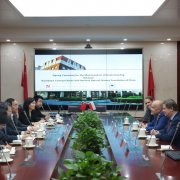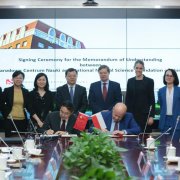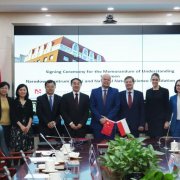We would like to invite all researchers to participate in SHENG1 – a new funding opportunity for joint Polish-Chinese research teams to be launched by the National Science Centre (NCN) and the National Natural Science Foundation of China (NSFC). The programme aims to support research projects in all fields of the Natural, Engineering, Life and Management sciences.Polish applicants can submit proposals in all areas of Life Sciences, Physical Sciences and Engineering and selected areas of Social Sciences (all subpanels of HS4, HS6_1, HS6_2, HS6_3, HS6_4, HS6_5, HS6_6, HS6_7, HS6_13, HS6_14).
Within the SHENG scheme, the NCN and NSFC will fund only projects involving basic research.
- Call announcement: 15th June 2018
- Call deadline: 17th September 2018
- Results: March 2019
- Start of joint research projects: June 2019 (Polish side), July 2019 (Chinese side)
A complete version of the call documents will be made available on the website in June 2018.
Eligibility
General requirements
- Only projects involving basic research will be funded.
- A Principal Investigator (PI) may submit only one proposal under the same call.
- Research project duration: 36 months.
- All costs must be eligible according to the national eligibility requirements.
Country specific requirements
Poland
- Eligible Host Institutions in Poland: academic or research organisations, research consortia, research networks and organisational units within institutions of higher education that do not constitute their basic organisational units, research centres of the Polish Academy of Sciences, academic research centres shared by higher education institutions, scientific libraries, other legal entities established in the territory of the Republic of Poland.
- Grants that are considered state aid will not be offered.
- The Polish Principal Investigator (PI) must hold at least a PhD degree to submit a proposal.
- The budget of the Polish part of the project must be at least 250 000 PLN.
China
- Eligible Host Institutions in China – please refer to NSFC regulations.
- The budget of the Chinese part of the project must not exceed 2 000 000 RMB.
Application process
A complete proposal (consisting of the joint project description in English and the CVs of both PIs and Co-investigators in English) should be submitted by the Polish applicant via the ZSUN/OSF submission system which can be found at https://osf.opi.org.pl by September 17th, 2018, together with all necessary documents conforming to the formal requirements set out in the call documentation.
Chinese PIs should submit all documents (including the complete proposal consisting of the joint project description in English and the CVs of both PIs and Co-investigators in English) required by the NSFC via the NSFC electronic submission system by September 17th, 2018.
Proposal review and evaluation procedure
All proposals will be reviewed by both organisations separately. Proposals will be subject to an eligibility check and peer review.
Only proposals which have been declared eligible by the NCN and NSFC will be peer reviewed.
At the NCN, the eligibility check of proposals will be carried out by the NCN Coordinators. The peer review will be performed by NCN Expert Teams and by External Reviewers.
At the NCN, the peer review will be carried out in two stages:
- Stage I – a preliminary evaluation will take place on the basis of data provided in the proposal by the External Reviewers other than the members of the Expert Team.
- Stage II – a final evaluation will be carried out on the basis of data provided in the proposal and the external reviews by the Expert Team, selected by NCN Research Council.
The proposal evaluation will take into account in particular:
- the research achievements of the Polish and Chinese PI, including their research portfolio,
- the quality of the research or tasks to be performed,
- the innovative nature of the project,
- the impact of the research carried out on the development of the discipline,
- the added value of bilateral cooperation,
- justification of the costs requested,
- the feasibility of the project.
Support will be granted for those proposals where both the NCN and NSFC recommend funding.
Allocation of funds
Funds for Polish research teams will be allocated on the basis of the decisions issued by the Director of the NCN. Funds for Chinese research teams will be allocated according to NSFC regulations.
Contact
Poland, NCN:
China, NSFC:
1The sheng (also spelt as cheng in Encyclopedia Britannica) is a Chinese mouth-blown free reed instrument consisting of vertical pipes. It is a polyphonic instrument and enjoys increasing popularity as a solo instrument.




